Module 11 Way of life Unit 1 课件(共45张PPT)
文档属性
| 名称 | Module 11 Way of life Unit 1 课件(共45张PPT) | 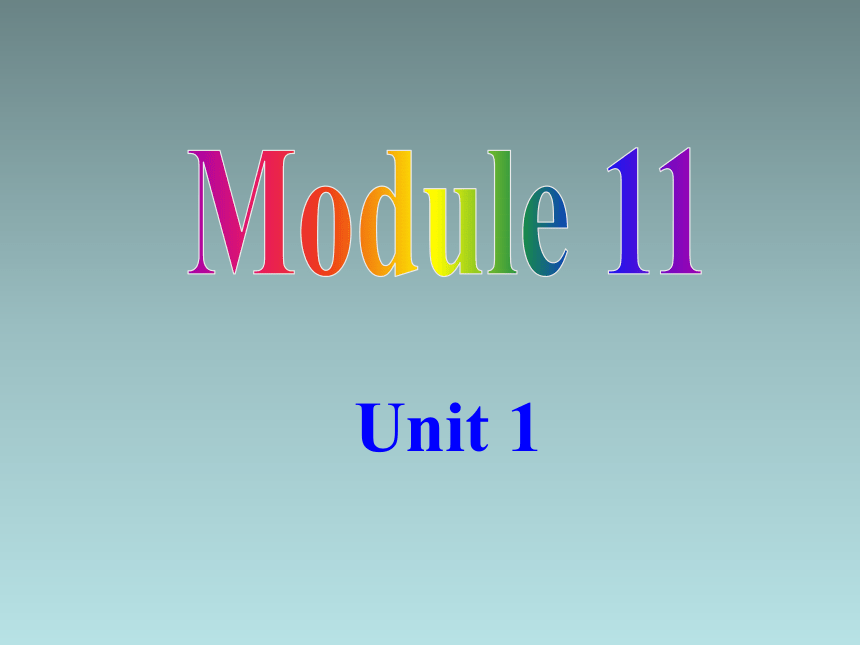 | |
| 格式 | ppt | ||
| 文件大小 | 2.4MB | ||
| 资源类型 | 教案 | ||
| 版本资源 | 外研版 | ||
| 科目 | 英语 | ||
| 更新时间 | 2022-07-31 13:56:17 | ||
图片预览

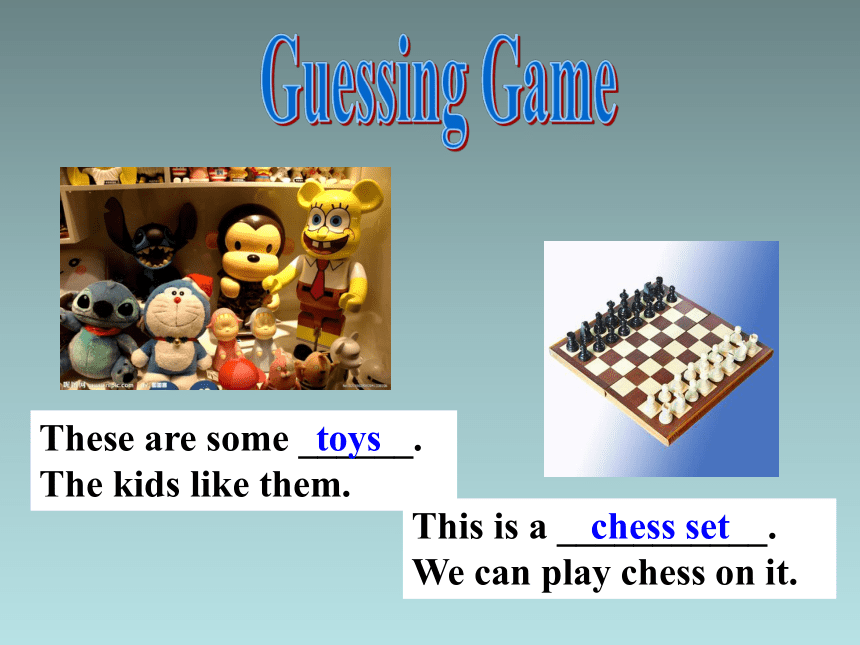
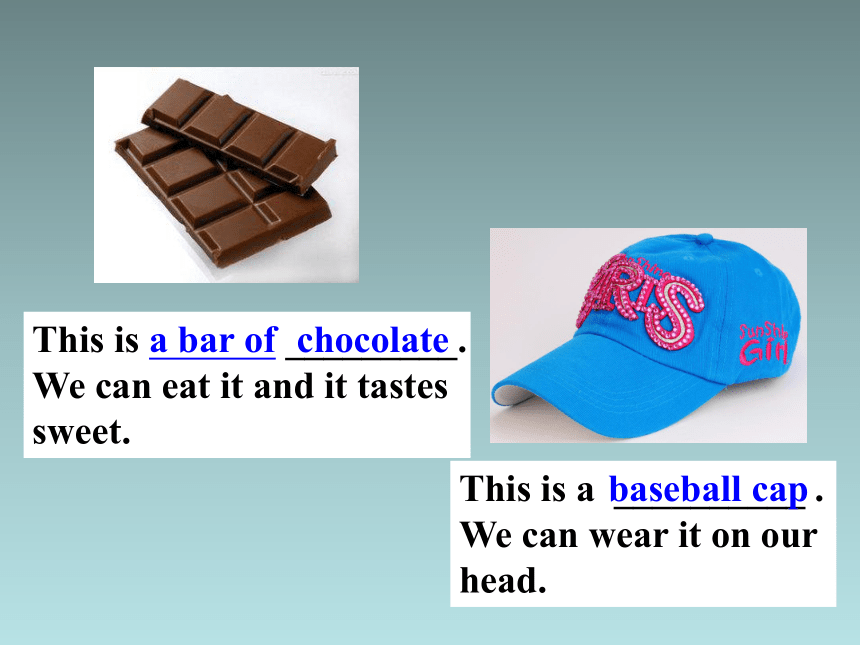
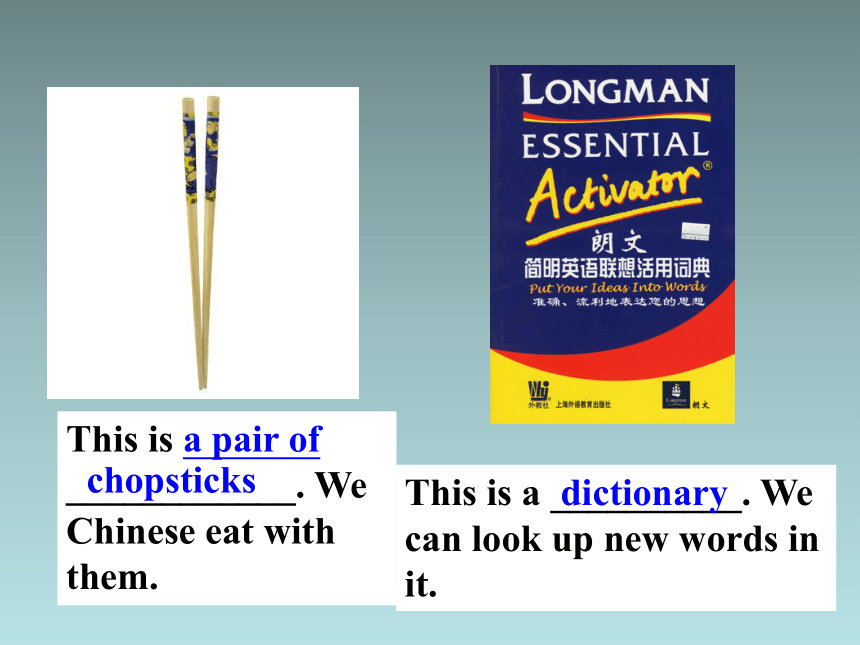
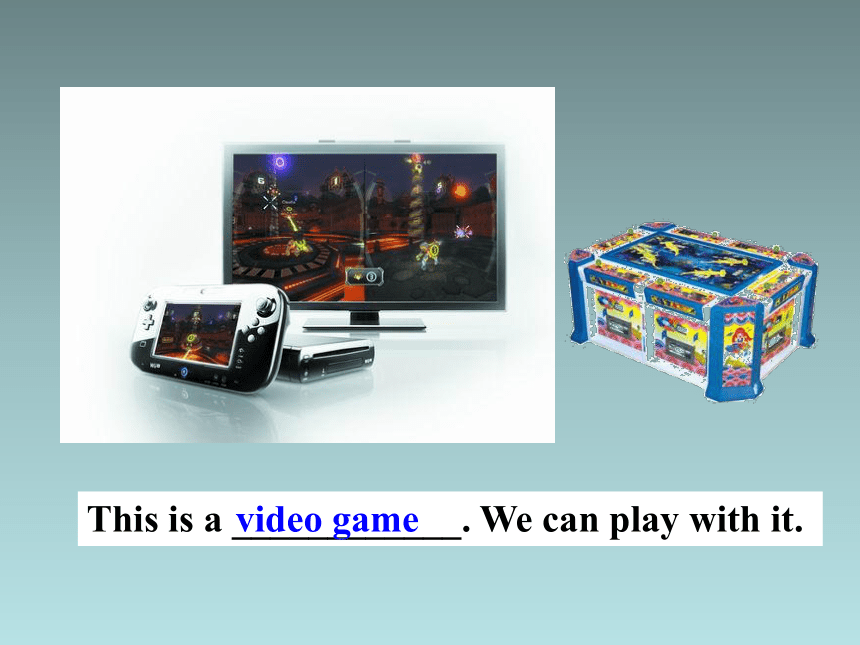
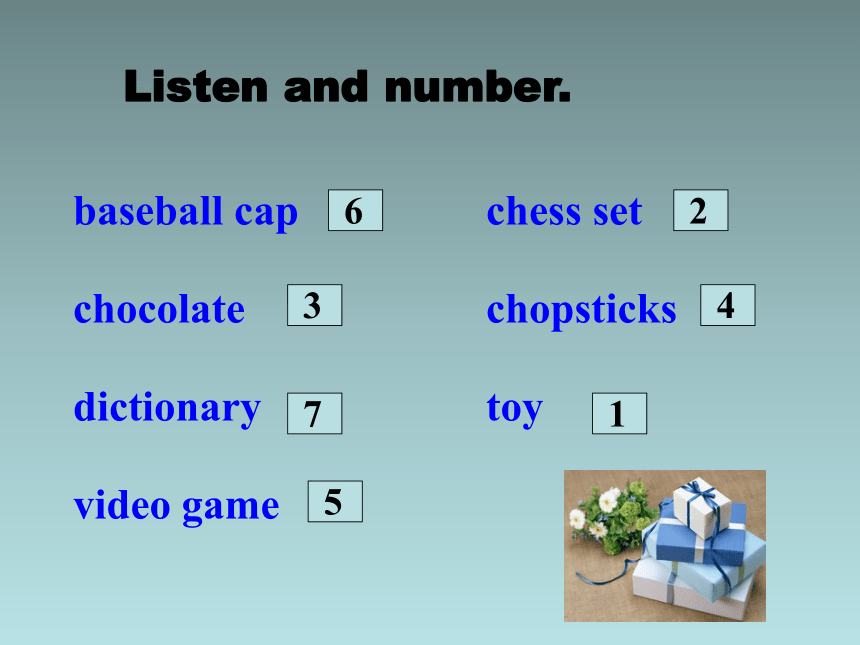
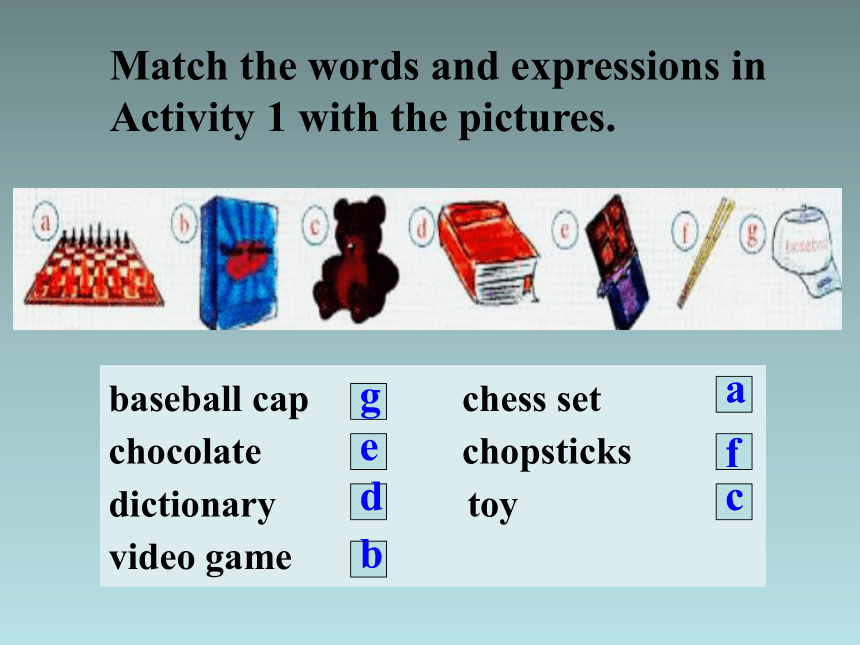
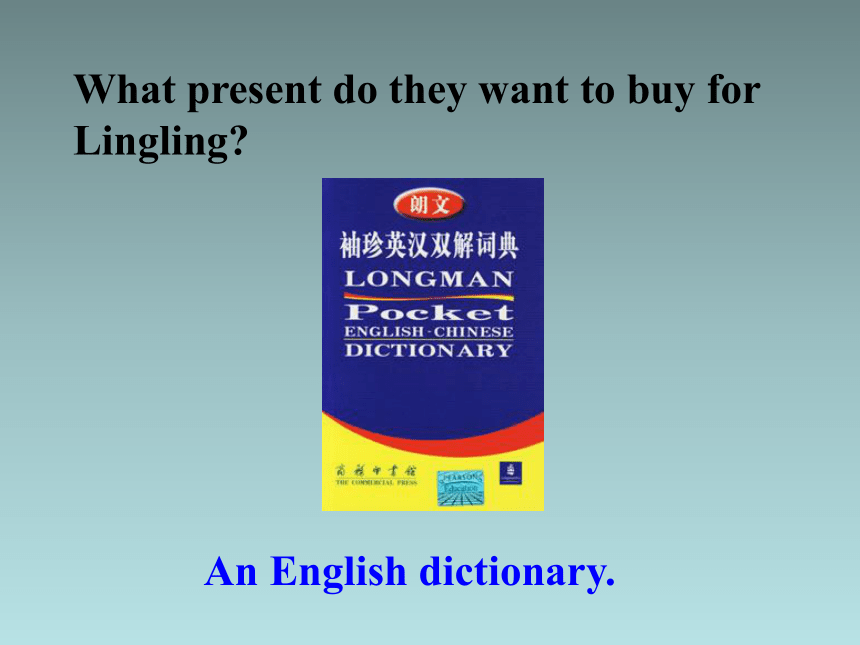
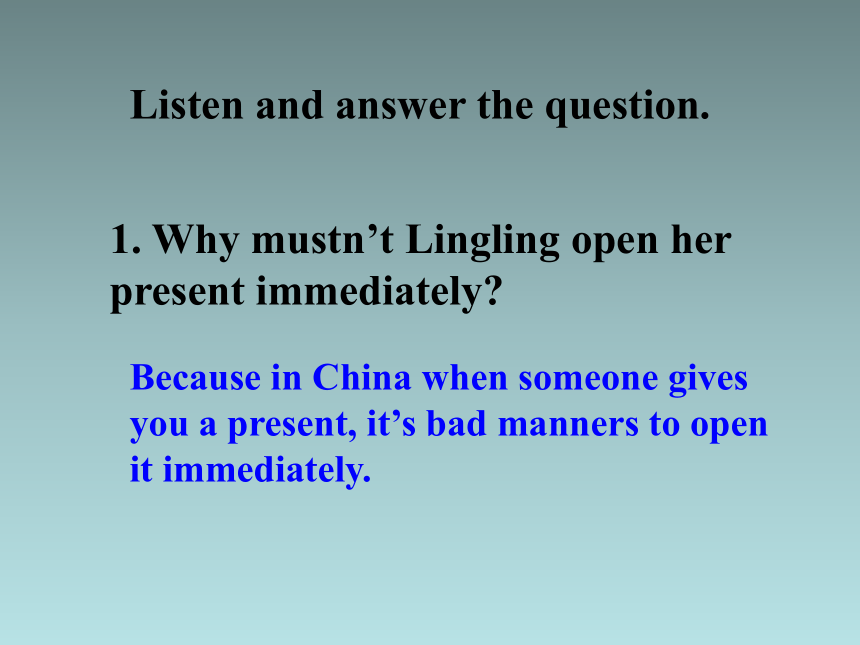
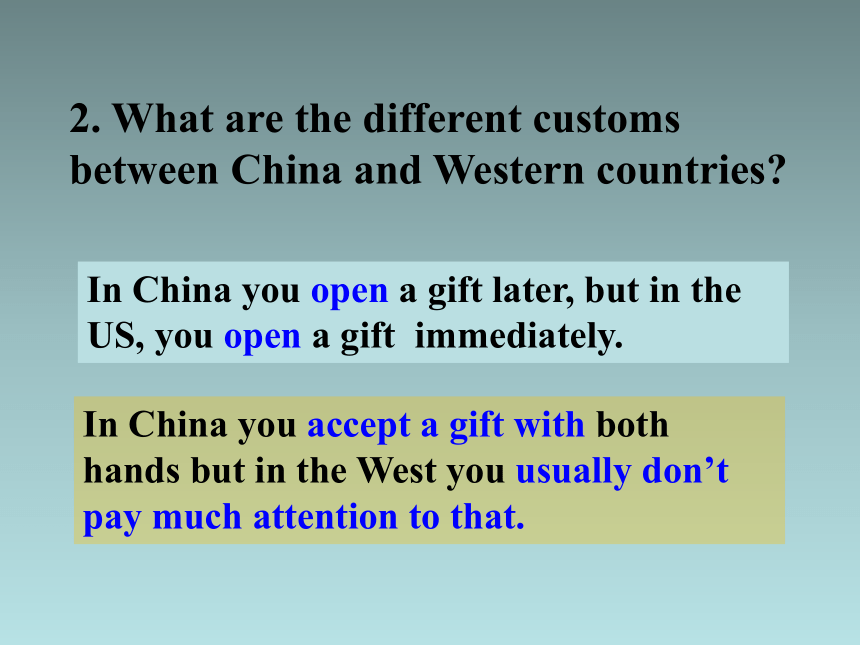
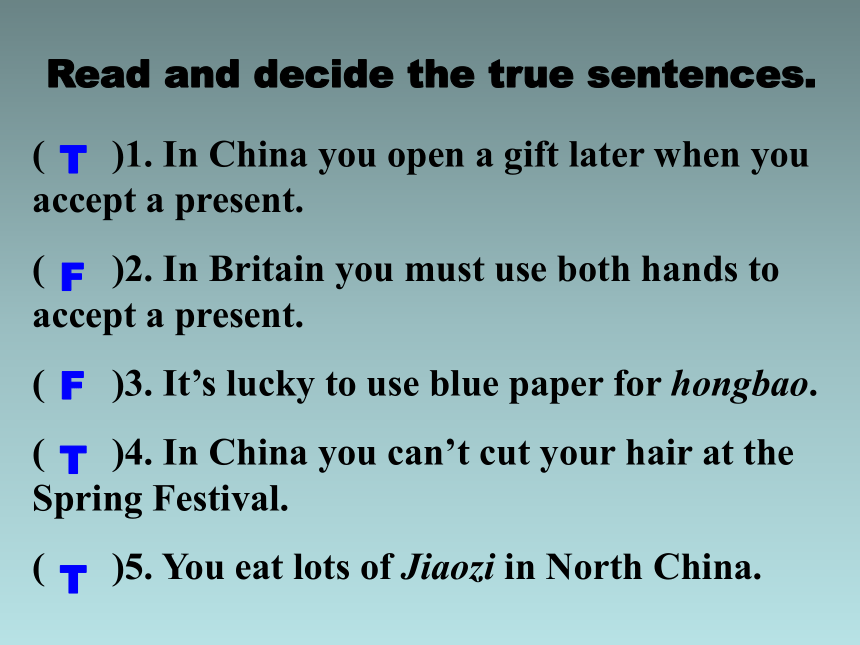
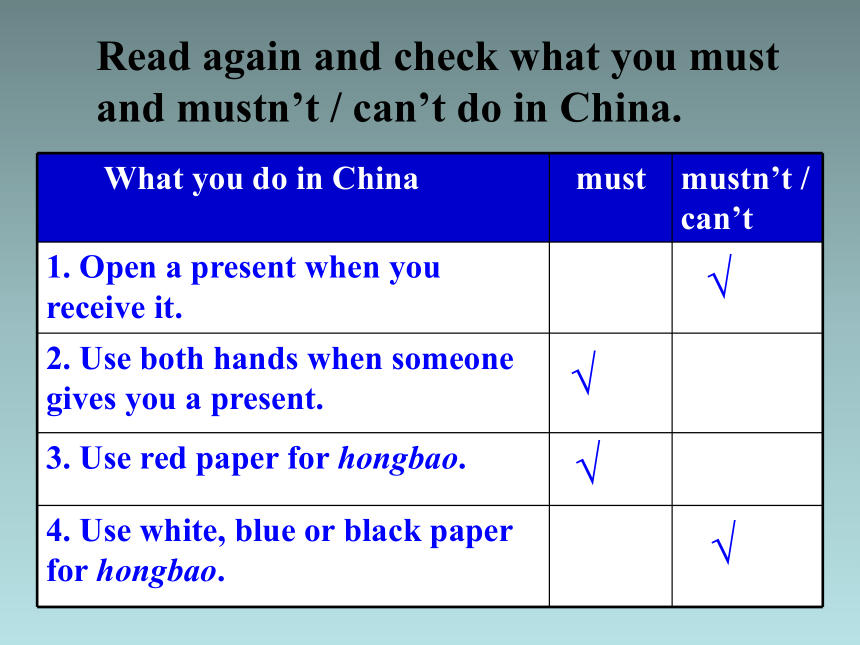
文档简介
(共45张PPT)
Unit 1
These are some ______. The kids like them.
toys
This is a ___________. We can play chess on it.
chess set
This is a bar of _________. We can eat it and it tastes sweet.
chocolate
This is a __________ . We can wear it on our head.
baseball cap
This is a __________. We can look up new words in it.
dictionary
This is a pair of ____________. We Chinese eat with them.
chopsticks
This is a ____________. We can play with it.
video game
baseball cap
chocolate
dictionary
video game
chess set
chopsticks
toy
Listen and number.
6
3
7
5
2
4
1
Match the words and expressions in Activity 1 with the pictures.
baseball cap chess set
chocolate chopsticks
dictionary toy
video game
g
e
d
b
c
f
a
What present do they want to buy for Lingling
An English dictionary.
1. Why mustn’t Lingling open her present immediately
Because in China when someone gives you a present, it’s bad manners to open it immediately.
Listen and answer the question.
In China you open a gift later, but in the US, you open a gift immediately.
In China you accept a gift with both hands but in the West you usually don’t pay much attention to that.
2. What are the different customs between China and Western countries
( )1. In China you open a gift later when you accept a present.
( )2. In Britain you must use both hands to accept a present.
( )3. It’s lucky to use blue paper for hongbao.
( )4. In China you can’t cut your hair at the Spring Festival.
( )5. You eat lots of Jiaozi in North China.
Read and decide the true sentences.
T
T
T
F
F
What you do in China must mustn’t / can’t
1. Open a present when you receive it.
2. Use both hands when someone gives you a present.
3. Use red paper for hongbao.
4. Use white, blue or black paper for hongbao.
√
√
√
√
Read again and check what you must and mustn’t / can’t do in China.
What you do in China must mustn’t / can’t
5. Do cleaning on the first day of Spring Festival.
6. Cut your hair at Spring Festival.
7. Break something at Spring Festival.
√
√
√
It is always a(n) (1) ________ to receive gifts from family members and friends. In China, we usually (2)_______ a gift with both hands and open it later.
surprise
accept
Complete the passage with the words in the box.
accept attention surprise
taste traditions
But in the West, people usually do not pay much (3) ________ to that. During the Spring Festival, there are many (4) _________. For example, people in the north of China eat lots of jiaozi. They (5) _______ great.
attention
traditions
taste
accept attention surprise
taste traditions
Read and remember these everyday English sentences.
Oh, you remembered!
What a surprise!
It’s bad luck!
You can’t be serious!
Perfect!
-- It’s a birthday cake for you, Lingling.
-- Wow, what a surprise!
-- Happy birthday, Lingling.
-- Oh, you remembered! Thank you so much.
-- I just broke the glass.
-- I’m sorry. It’s bad luck!
-- I went to the concert last night.
-- You can’t be serious. What do you think of it
-- Perfect! I love it so much.
Read and predict how the speaker will pronounce the underlined words.
1. I don’t think I should open it now.
2. You needn’t wait.
3. You mustn’t break anything.
4. You must only use red paper for hongbao.
5. You’d better not cut your hair during the Spring Festival month.
Read the sentences aloud.
1. I don’t think I should open it now.
2. You needn’t wait.
3. You mustn’t break anything.
4. You must only use red paper for hongbao.
5. You’d better not cut your hair during the Spring Festival month.
listen to
throw paper
use mobile phones
do our homework
be late for
clean the classroom
Think about what you must and mustn’t / can’t do in the situations.
Must Mustn’t
At school
At the dining table
put up your hand before you talk
talk with food in your mouth
Let’s make rules for a zoo.
must / mustn’t / can’t
feed the animals
take away the litter
be quiet
clap on their cages
Do you have any rules in your family Talk about them to the class.
1. Here’s your gift!
以here, there等副词开头的句子,当其主语是名词时,该句通常使用倒装结构。但当其主语是代词时, 一般不倒装。如:
There goes the bell. 铃响了。
Look! Here are my father and mother.
看!我的爸爸妈妈来了。
Here comes the bus! 公交来了!
2. surprise
surprise n.惊奇;意外之事;惊喜
I have a surprise for you: We are moving to Switzerland!
我有一个惊喜的消息要告诉你:我们要搬去瑞士了!
My father decides to send me a purse as a surprise.
父亲决定送我一个钱包作为惊喜。
adj. surprising 令人吃惊的
surprised (人)感到吃惊的
What a surprise! 好惊讶!
这是一个感叹句。英语中的干套句通常以what和how开头,what修饰名词,how 修饰形容词、副词或动词。
What a smart boy he is!
多聪明的男孩啊!
How kind you are!
你人真好!
surprise v.使(某人)吃惊/意外
We’ll solve the case ourselves and surprise everyone.
我们要自己解决这件事,然后让所有人感到吃惊。
It won’t surprise me if they get married very soon.
即使他们很快就结婚,我也不会感到意外。
相关拓展
in surprise
by surprise
to one’s surprise
What a surprise!
It surprised sb. that ...
吃惊地
出其不意地;猝不及防地
令某人吃惊的是
真令人吃惊!/真是个惊喜!
令人吃惊的是...
To our_________, the old man climbed up to the top of the mountain.
A. surprised B. surprises
C. surprise D. surprising
答案:C
解析:本题考查surprise的用法,其中to one’s surprise是固定搭配,意为“令某人吃惊的是”。
3. accept
accept v. 接受;答应
表示自愿、主动地接受,常用于accept sth. /sb.的结构中。
We gave him a present, but he did not
Accept it.
我们给他一件礼物,但他不肯接受。
I accept your apology.
我接受你的道歉。
You are brave enough to a_______ (接受) such a difficult job.
我接受了你的劝告。
accept
I accepted your advice.
[拓展]
accept的反义词是refuse
refuse v. 拒绝,回绝
常用于refuse sth. / to do sth.结构。
I refuse to answer that question.
我不愿回答那个问题。
[辨析] receive和accept
receive:“收到”,表示客观的情况
accept:“接受”,表示主观的情况
accept a gift:表示接受礼物
receive a gift:只是收到礼物,但不一定接受。
He received a gift, but he didn’t accept it.
他收到了一件礼物,但他没有接受。
1. 她非常愉快地接受了邀请。
She was very glad to _______ the invitation.
2. 昨天我接到一份参加晚会的邀请,但我拒绝了接受它。
I ________ an invitation to the party yesterday, but I refused to ________ it.
3.我们很久没有收到他的来信了。
We haven’t ________ his letter for a long time.
accept
received
accept
received
用 receive 或 accept 填空 :
He __________ a present yesterday, but
he didn't ________ it, because it was too expensive and he sent it back.
2. I _________ his letter yesterday.
3. He didn't ________ my suggestion.
4. She _________ a good education.
received
accept
received
accept
received
4. do some cleaning
do some cleaning 清洁;打扫卫生
I usually do some cleaning on Sunday.
周日我通常打扫卫生。
类似结构的短语还有:
do some washing 洗衣服
do some reading 读书
do some cooking 做饭
do some writing 写字
do some shopping 购物
5. had better
had better (do sth.) 意为“最好……”,表示劝告或建议。如:
You had better have another think.
你最好再想一想。
You had better eat more fruit and vegetables.
你最好多吃些水果和蔬菜。
否定形式: had better not do sth.
你今天最好待在那儿。 You _____ _____ ______ there today.
你最好不要在早饭时间去看他。
You ______ ____ _______ ______ to see him at breakfast time.
had better not go
had better stay
6. You can’t be serious! 你不会是认真的吧!
/你一定是开玩笑吧!
-- I will marry Mike next week.
我下星期要和迈克结婚。
-- You can't be serious. You have only known
him for two months.
你不是认真的吧,你才认识他两个月呀。
-- I’m going to a party on Thursday night at Jimmy's house.
-- _________! You'll have two tests at school on Friday.
A. It's easy to say so
B. That's exciting
C. Enjoy yourself
D. You can't be serious
【解析】由于后一句“有考试”,这里不能回答“玩得开心”;You can't be serious!意思是“你一定是开玩笑吧!”。
D
— Chris has learnt English for only
three months.
—________! His English is so good.
A. He got it
B. Believe it or not
C. I can’t agree more
D. You can’t be serious
D
serious在这里的意思是“认真的;不开玩笑的”
I was serious in what I said at dinner.
我吃饭时说的那番话是认真的。
Let's have a serious talk about your future.
让我们认真谈一谈你的未来。
He was serious about the matter.
他对于那件事很认真。
It is Lingling’s birthday. Her friends have got her a __________. Tony asks her to open it at once, but Lingling can’t. This is because the Chinese __________ are different from those of the USA. The Chinese must _________ and open it later.
Complete the passage.
gift
customs
wait
Daming also tells his friends some other customs in China. When people ________ a gift, they must use both hands. But in the West people don’t pay much attention to that. And people must use red paper for hongbao because it’s _________. Anything else The Chinese mustn’t do any _________ on the first day of the Chinese New Year. And they can’t ________ their hair. They mustn’t _______ anything because it’s bad luck. The Chinese eat lots of jiaozi in the North.
accept
lucky
cleaning
cut
break
Unit 1
These are some ______. The kids like them.
toys
This is a ___________. We can play chess on it.
chess set
This is a bar of _________. We can eat it and it tastes sweet.
chocolate
This is a __________ . We can wear it on our head.
baseball cap
This is a __________. We can look up new words in it.
dictionary
This is a pair of ____________. We Chinese eat with them.
chopsticks
This is a ____________. We can play with it.
video game
baseball cap
chocolate
dictionary
video game
chess set
chopsticks
toy
Listen and number.
6
3
7
5
2
4
1
Match the words and expressions in Activity 1 with the pictures.
baseball cap chess set
chocolate chopsticks
dictionary toy
video game
g
e
d
b
c
f
a
What present do they want to buy for Lingling
An English dictionary.
1. Why mustn’t Lingling open her present immediately
Because in China when someone gives you a present, it’s bad manners to open it immediately.
Listen and answer the question.
In China you open a gift later, but in the US, you open a gift immediately.
In China you accept a gift with both hands but in the West you usually don’t pay much attention to that.
2. What are the different customs between China and Western countries
( )1. In China you open a gift later when you accept a present.
( )2. In Britain you must use both hands to accept a present.
( )3. It’s lucky to use blue paper for hongbao.
( )4. In China you can’t cut your hair at the Spring Festival.
( )5. You eat lots of Jiaozi in North China.
Read and decide the true sentences.
T
T
T
F
F
What you do in China must mustn’t / can’t
1. Open a present when you receive it.
2. Use both hands when someone gives you a present.
3. Use red paper for hongbao.
4. Use white, blue or black paper for hongbao.
√
√
√
√
Read again and check what you must and mustn’t / can’t do in China.
What you do in China must mustn’t / can’t
5. Do cleaning on the first day of Spring Festival.
6. Cut your hair at Spring Festival.
7. Break something at Spring Festival.
√
√
√
It is always a(n) (1) ________ to receive gifts from family members and friends. In China, we usually (2)_______ a gift with both hands and open it later.
surprise
accept
Complete the passage with the words in the box.
accept attention surprise
taste traditions
But in the West, people usually do not pay much (3) ________ to that. During the Spring Festival, there are many (4) _________. For example, people in the north of China eat lots of jiaozi. They (5) _______ great.
attention
traditions
taste
accept attention surprise
taste traditions
Read and remember these everyday English sentences.
Oh, you remembered!
What a surprise!
It’s bad luck!
You can’t be serious!
Perfect!
-- It’s a birthday cake for you, Lingling.
-- Wow, what a surprise!
-- Happy birthday, Lingling.
-- Oh, you remembered! Thank you so much.
-- I just broke the glass.
-- I’m sorry. It’s bad luck!
-- I went to the concert last night.
-- You can’t be serious. What do you think of it
-- Perfect! I love it so much.
Read and predict how the speaker will pronounce the underlined words.
1. I don’t think I should open it now.
2. You needn’t wait.
3. You mustn’t break anything.
4. You must only use red paper for hongbao.
5. You’d better not cut your hair during the Spring Festival month.
Read the sentences aloud.
1. I don’t think I should open it now.
2. You needn’t wait.
3. You mustn’t break anything.
4. You must only use red paper for hongbao.
5. You’d better not cut your hair during the Spring Festival month.
listen to
throw paper
use mobile phones
do our homework
be late for
clean the classroom
Think about what you must and mustn’t / can’t do in the situations.
Must Mustn’t
At school
At the dining table
put up your hand before you talk
talk with food in your mouth
Let’s make rules for a zoo.
must / mustn’t / can’t
feed the animals
take away the litter
be quiet
clap on their cages
Do you have any rules in your family Talk about them to the class.
1. Here’s your gift!
以here, there等副词开头的句子,当其主语是名词时,该句通常使用倒装结构。但当其主语是代词时, 一般不倒装。如:
There goes the bell. 铃响了。
Look! Here are my father and mother.
看!我的爸爸妈妈来了。
Here comes the bus! 公交来了!
2. surprise
surprise n.惊奇;意外之事;惊喜
I have a surprise for you: We are moving to Switzerland!
我有一个惊喜的消息要告诉你:我们要搬去瑞士了!
My father decides to send me a purse as a surprise.
父亲决定送我一个钱包作为惊喜。
adj. surprising 令人吃惊的
surprised (人)感到吃惊的
What a surprise! 好惊讶!
这是一个感叹句。英语中的干套句通常以what和how开头,what修饰名词,how 修饰形容词、副词或动词。
What a smart boy he is!
多聪明的男孩啊!
How kind you are!
你人真好!
surprise v.使(某人)吃惊/意外
We’ll solve the case ourselves and surprise everyone.
我们要自己解决这件事,然后让所有人感到吃惊。
It won’t surprise me if they get married very soon.
即使他们很快就结婚,我也不会感到意外。
相关拓展
in surprise
by surprise
to one’s surprise
What a surprise!
It surprised sb. that ...
吃惊地
出其不意地;猝不及防地
令某人吃惊的是
真令人吃惊!/真是个惊喜!
令人吃惊的是...
To our_________, the old man climbed up to the top of the mountain.
A. surprised B. surprises
C. surprise D. surprising
答案:C
解析:本题考查surprise的用法,其中to one’s surprise是固定搭配,意为“令某人吃惊的是”。
3. accept
accept v. 接受;答应
表示自愿、主动地接受,常用于accept sth. /sb.的结构中。
We gave him a present, but he did not
Accept it.
我们给他一件礼物,但他不肯接受。
I accept your apology.
我接受你的道歉。
You are brave enough to a_______ (接受) such a difficult job.
我接受了你的劝告。
accept
I accepted your advice.
[拓展]
accept的反义词是refuse
refuse v. 拒绝,回绝
常用于refuse sth. / to do sth.结构。
I refuse to answer that question.
我不愿回答那个问题。
[辨析] receive和accept
receive:“收到”,表示客观的情况
accept:“接受”,表示主观的情况
accept a gift:表示接受礼物
receive a gift:只是收到礼物,但不一定接受。
He received a gift, but he didn’t accept it.
他收到了一件礼物,但他没有接受。
1. 她非常愉快地接受了邀请。
She was very glad to _______ the invitation.
2. 昨天我接到一份参加晚会的邀请,但我拒绝了接受它。
I ________ an invitation to the party yesterday, but I refused to ________ it.
3.我们很久没有收到他的来信了。
We haven’t ________ his letter for a long time.
accept
received
accept
received
用 receive 或 accept 填空 :
He __________ a present yesterday, but
he didn't ________ it, because it was too expensive and he sent it back.
2. I _________ his letter yesterday.
3. He didn't ________ my suggestion.
4. She _________ a good education.
received
accept
received
accept
received
4. do some cleaning
do some cleaning 清洁;打扫卫生
I usually do some cleaning on Sunday.
周日我通常打扫卫生。
类似结构的短语还有:
do some washing 洗衣服
do some reading 读书
do some cooking 做饭
do some writing 写字
do some shopping 购物
5. had better
had better (do sth.) 意为“最好……”,表示劝告或建议。如:
You had better have another think.
你最好再想一想。
You had better eat more fruit and vegetables.
你最好多吃些水果和蔬菜。
否定形式: had better not do sth.
你今天最好待在那儿。 You _____ _____ ______ there today.
你最好不要在早饭时间去看他。
You ______ ____ _______ ______ to see him at breakfast time.
had better not go
had better stay
6. You can’t be serious! 你不会是认真的吧!
/你一定是开玩笑吧!
-- I will marry Mike next week.
我下星期要和迈克结婚。
-- You can't be serious. You have only known
him for two months.
你不是认真的吧,你才认识他两个月呀。
-- I’m going to a party on Thursday night at Jimmy's house.
-- _________! You'll have two tests at school on Friday.
A. It's easy to say so
B. That's exciting
C. Enjoy yourself
D. You can't be serious
【解析】由于后一句“有考试”,这里不能回答“玩得开心”;You can't be serious!意思是“你一定是开玩笑吧!”。
D
— Chris has learnt English for only
three months.
—________! His English is so good.
A. He got it
B. Believe it or not
C. I can’t agree more
D. You can’t be serious
D
serious在这里的意思是“认真的;不开玩笑的”
I was serious in what I said at dinner.
我吃饭时说的那番话是认真的。
Let's have a serious talk about your future.
让我们认真谈一谈你的未来。
He was serious about the matter.
他对于那件事很认真。
It is Lingling’s birthday. Her friends have got her a __________. Tony asks her to open it at once, but Lingling can’t. This is because the Chinese __________ are different from those of the USA. The Chinese must _________ and open it later.
Complete the passage.
gift
customs
wait
Daming also tells his friends some other customs in China. When people ________ a gift, they must use both hands. But in the West people don’t pay much attention to that. And people must use red paper for hongbao because it’s _________. Anything else The Chinese mustn’t do any _________ on the first day of the Chinese New Year. And they can’t ________ their hair. They mustn’t _______ anything because it’s bad luck. The Chinese eat lots of jiaozi in the North.
accept
lucky
cleaning
cut
break
同课章节目录
- Module 1 How to learn English
- Unit 1 Let's try to speak English as much as possi
- Unit 2 You should smile at her.
- Unit 3 Language in use .
- Module 2 My home town and my country
- Unit 1 It's taller than many other buildings.
- Unit 2 Cambridge is a beautiful city in the east o
- Unit 3 Language in use .
- Module 3 Sports.
- Unit 1 Nothing is more exciting than playing tenni
- Unit 2 This year we training more carefully.
- Unit 3 Language in use .
- Module 4 Planes, ships and trains .
- Unit 1 He lives the farthest from school.
- Unit 2 What is the best way to travel.
- Unit 3 Language in use .
- Module 5 Lao She Teahouse.
- Unit 1 I wanted to see the Beijing Opera.
- Unit 2 It descibes the changes in Chinese society.
- Unit 3 Language in use .
- Module 6 Animals in danger.
- Unit 1 It allows people to get closer to them .
- Unit 2 The WWF is working hard to save them all.
- Unit 3 Language in use .
- Revision module A
- Module 7 A famous story
- Unit 1 Alice was sitting with her sister by the ri
- Unit 2 She was thinking about her cat.
- Unit 3 Language in use .
- Module 8 Accidents
- Unit 1 While the car were changing to red, a car s
- Unit 2 I was trying to pick it up when it bite me
- Unit 3 Language in use .
- Module 9 Population
- Unit 1 The population of China is about 1.37 billi
- Unit 2 Arnwick was a city with 200,000 people.
- Unit 3 Language in use .
- Module 10 The weathe
- Unit 1 It might snow.
- Unit 2 The weather is fine all year round.
- Unit 3 Language in use .
- Module 11 Way of life
- Unit 1 In China ,we open a gift later.
- Unit 2 In England, you usually drink tea with milk
- Unit 3 Language in use .
- Module 12 Help
- Unit 1 What should we do before help arrives?
- Unit 2 Stay away from windows and heavy furniture.
- Unit 3 Language in use .
- Revision module B
